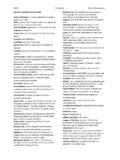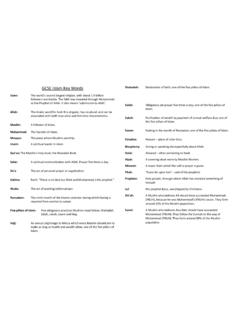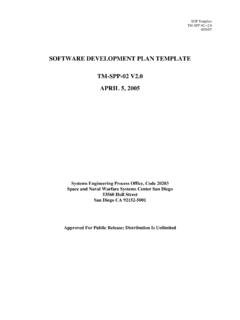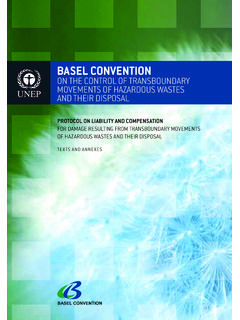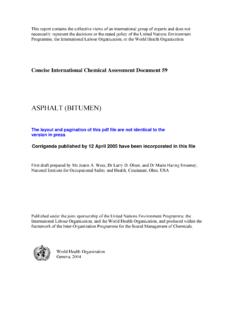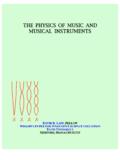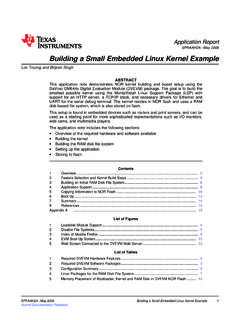Transcription of Language Devices and their Effects FINAL …
1 Language Devices and their Effects Device Description effect (s)ModelresponseWriter s use of evidence and supportFacts A fact is a piece of information that can be demonstrated or proven to be true. Facts are used to demonstrate or emphasise a writer's point by providing evidence to support claims For example: 'As well as nicotine, each cigarette contains more than 4,000 different chemicals, many of which are harmful to the body'. The facts used in this article provide medical evidence that cigarettes are dangerous. The reference to 4,000 different chemicals is a fact that is designed to shock the reader; this makes the text more powerful.
2 Opinions An opinion is an individual's own thoughts or beliefs Like facts, opinions emphasise the point of a writer but make the message more personal rather than completely factual For example: 'Smoking is an awful habit and anyone who smokes stinks'. By expressing the strong opinion that smoking is an awful habit and that anyone who smokes stinks, the writer makes the message more personal, emphasises the negative points of smoking, and makes the reader feel almost obliged to have a response. Statistics A statistic is numerical data Numerical data can be used like facts to emphasise and demonstrate the point of the writer For example: '9 out of 10 people voted against the proposal The statistic 9 out of 10 people emphasises the significant numbers opposing the development and lends weight to the argument that the building programme should not go ahead.
3 Anecdotes A mini story from personal experience about a person or incident Enhances the argument. It makes the text more personal and connects to the reader s experiences For example: Just yesterday I was walking home from school when .. When the writer describes her experience with an anecdote Just yesterday I .. she gives the text a very personal edge and many of us can connect here with similar experiences of our own which adds immediacy to her text. Quotations Evidence from source and in non fiction writing often an expert source It can create added authority to make the text more convincing. Adds credibility to an argument. For example: Animal research expert Martin Davis said All the evidence from our studies point to the fact that elephants could be extinct in 20 years if nothing is done to prevent tusk hunting.
4 The study stating that elephants could be extinct in 20 years is convincing because we know it is given by an animal research expert and this helps the article persuade us that something needs to be done since the evidence is being provided by an expert in the field. Writer s text design Devices across a textFormal voice We use formal Language in situations that are serious or that involve people we don t know well. Formal Language is more common when we write; There are also examples where spoken English can be very formal, for example, in a speech or a lecture. This makes a text seem more authoritative, with more power of persuasion For example: After reading an article about the frightening increase in truancy rates in Britain, I feel compelled to offer my views on the subject.
5 I was shocked and surprised at the astoundingly high numbers of students who truant every day. The use of formal voice in this letter gives it an authoritative tone. The word compelled makes the reader aware of the seriousness of the writer s intention. The phrase astoundingly high is a formal expression which maintains the serious tone. Informal voice Informal Language is more commonly used in situations that are more relaxed and involve people we know well. Although more common when we speak, there are times where writing can be very informal eg, letters to friends, emails or texts . This Involves the reader at a more personal level. It engages and makes the text more accessible.
6 For example: The problem with being a parent is kids! I know I am sounding like something out a TV sitcom, but that s the way I see it. Now don t get me wrong, I love my kids, but come on I ve got a life, they ve got a life, we all have. So let s try to meet half way. The use of informal voice helps engage the reader as it seems more familiar and relaxed, and it helps to form a clear picture of the writer and his attitudes. It makes for lively, entertaining reading. In fact you could almost imagine him sitting in front of you saying these words. It certainly stimulates a response from the reader. First person perspective A narrative mode that involves one narrator speaking of and about themselves use of I and personal pronouns like we us This makes the text more personal, gives it a personal voice, which interests the reader as they may feel like they can 'relate' to the writer or that they 'know' them somehow.
7 It invites empathy as the writer is likely to express personal thoughts and feelings. The inclusive pronoun we can make the reader feel part of what is being written. For example: As a committed meat eater I have to acknowledge that if I want my grandchildren ever to enjoy a perfect steak I must address my habits now: all this animal munching cannot go on. We all need to see meat eating as more of a luxury. By involving himself and his own eating habits he makes his case stronger. The text feels more personal and we can relate to his experience because eating meat is something most of us do. He opens out to include the personal pronoun we which gives his text an inclusive feel and makes it more powerful.
8 Third person perspective In narrative, it is a mode that involves the narrator referring to characters as "he"/"she"/"it"/etc . In non fiction it works in a slightly different way Third person narration allows for a separation between the narrator and the character and allows for more information to be revealed to the audience of which even the character may not be aware. Third person perspective in non fiction is appropriate to retain a more impersonal and distant perspective. For example: As a means of discouraging children from a couch potato lifestyle, it ranks among the more bizarre solutions. A designer has come up with a device that stops the user watching television until they have done enough exercise.
9 The use of third person perspective here helps create a more impersonal and reflective report. The purpose is to inform and it helps maintain a distance between the subject and the opinions of the writer. It is for the audience to read, reflect and form an opinion on the subject. Direct address ( Second person perspective ) Direct address is when the text addresses the reader in a way that makes it sound personal achieved through use of second person narration 'You'. Directly addressing the reader involves them in the text and makes them think harder about what the text is 'saying'. It can create a friendly tone and involve the reader making it feel as though the text is addressed directly at the reader involving them personally.
10 It can feel friendly, inviting even confiding. It can also feel forceful and persuasive. For example: It s a feeling that stays with you forever. That wonderful moment when you sit behind the wheel and notice that for the first time that the passenger seat isn t occupied by an instructor or examiner. The writer is sharing a feeling that is not just personal but something many adults will have experienced that thrill of passing your driving test and the freedom it gives you. An adult reader will feel more involved because they share the same emotional response. Tone Tone is the author s attitude to the topic. Objective tone is impartial it does not show any feelings for or against.
